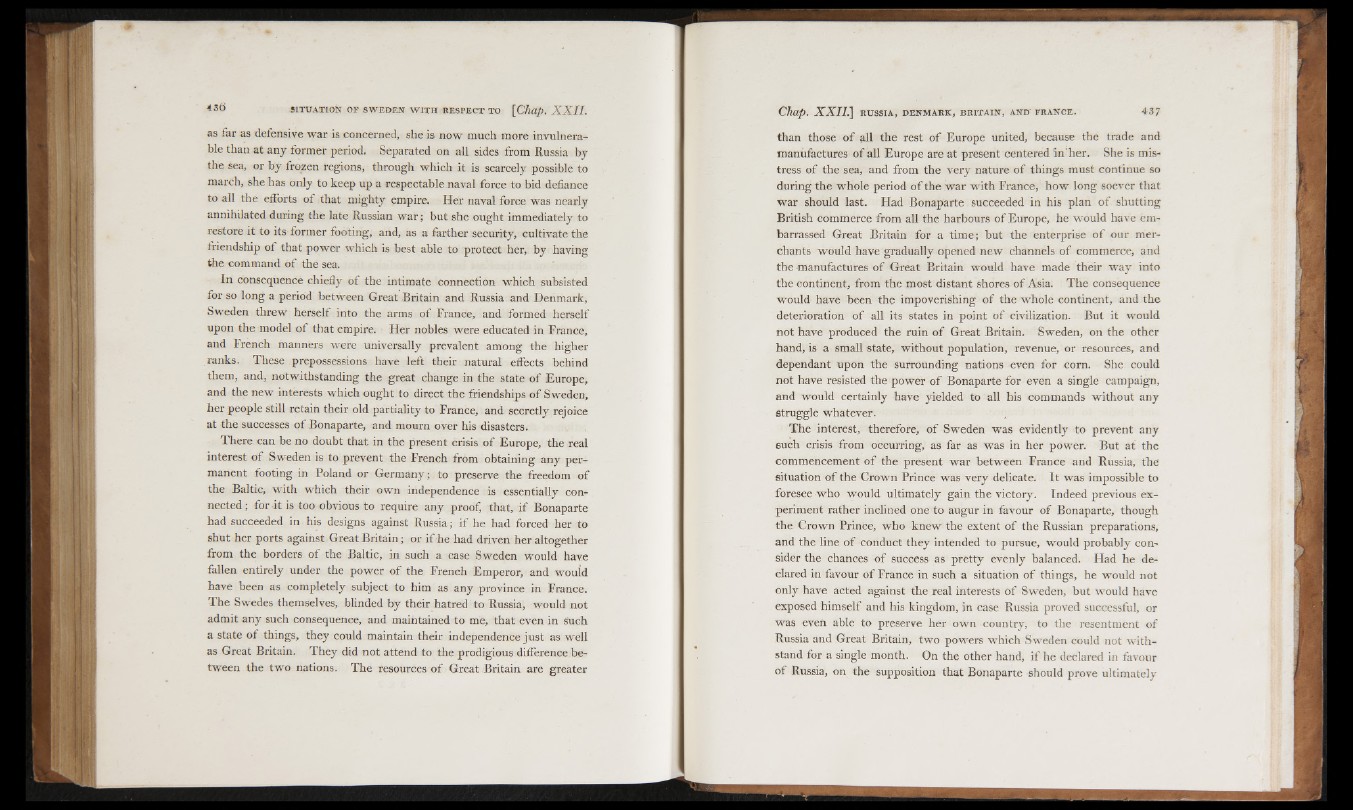
as far as defensive war is concerned, she is now much more invulnerable
than at any former period. Separated on all sides from Russia by
the sea, or by frozen regions, through which it is scarcely possible to
march, she has only to keep up a respectable naval force to bid defiance
to all the efforts of that mighty empire. Her naval force was nearly
annihilated during the late Russian war; but she ought immediately to
restore it to its former footing, and, as a farther security, cultivate the
friendship o f that power which is best able to protect her, by having
the command o f the sea.
In consequence chiefly of the intimate connection which subsisted
for so long a period between Great Britain and Russia and Denmark,
Sweden threw herself into the arms of France, and formed herself
upon the model o f that empire. Her nobles were educated in France,
and French manners were universally prevalent among the higher
ranks. These prepossessions have left their natural effects behind
them, and, notwithstanding the great change in the state of Europe,
and the new interests which ought to direct the friendships o f Sweden,
her people still retain their old partiality to France, and secretly rejoice
at the successes of Bonaparte, and mourn over his disasters.
There can be no doubt that in the present crisis o f Europe, the real
interest o f Sweden is to prevent the French from obtaining any permanent
footing in Poland or Germany; to preserve the freedom of
the Baltic, with which their own independence is essentially connected
; for it is too obvious to require any proof, that, i f Bonaparte
had succeeded in his designs against Russia; i f he had forced her to
shut her ports against Great Britain; or i f he had driven her altogether
from the borders of the Baltic, in such a case Sweden would have
fallen entirely under the power o f the French Emperor, and would
have been as completely subject to him as any province in France.
The Swedes themselves, blinded by their hatred to Russia, would not
admit any such consequence, and maintained to me, that even in Such
a state of things, they could maintain their independence just as well
as Great Britain. They did not attend to the prodigious difference between
the two nations. The resources of Great Britain are greater
than those o f all the rest o f Europe united, because the trade and
manufactures of all Europe are at present centered in'her. She is mistress
of the sea, and from the very nature o f things must continue so
during the whole period of the war with France, how long soever that
war should last. Had Bonaparte succeeded in his plan o f shutting
British commerce from all the harbours of Europe, he would have embarrassed
Great Britain for a time; but the enterprise o f our merchants
would have gradually opened new channels o f commerce, and
the manufactures o f Great Britain would have made their way into
the continent, from the most distant shores of Asia. The consequence
would have been the impoverishing of the whole continent, and the
deterioration of all its states in point o f civilization. But it would
not have produced the ruin of Great Britain. Sweden, on the other
hand, is a small state, without population, revenue, or resources, and
dependant upon the surrounding nations even for corn. She could
not have resisted the power o f Bonaparte for even a single campaign,
and would certainly have yielded to all his commands without any
struggle whatever.
The interest, therefore, o f Sweden was evidently to prevent any
such crisis from occurring, as far as was in her power. But at the
commencement of the present war between France and Russia, the
situation o f the Crown Prince was very delicate. It was impossible to
foresee who would ultimately gain the victory. Indeed previous experiment
rather inclined one to augur in favour o f Bonaparte, though
the Crown Prince, who knew the extent of the Russian preparations,
and the line of conduct they intended to pursue, would probably consider
the chances of success as pretty evenly balanced. Had he declared
in favour of France in such a situation o f things, he would not
only have acted against the real interests o f Sweden, but would have
exposed himself and his kingdom, in case Russia proved successful, or
was even able to preserve her own country, to the resentment of
Russia and Great Britain, two powers which Sweden could not withstand
for a single month. On the other hand, i f he declared in favour
of Russia, on the supposition that Bonaparte should prove ultimately